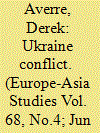| Srl | Item |
| 1 |
ID:
188115


|
|
|
|
|
| Summary/Abstract |
Germany’s recent Ostpolitik (Eastern Policy) has become a major topic in Western discussions about how to deal best with Vladimir Putin’s Russia. This essay proceeds from Interdependence Theory to argue that the Berlin-promoted Nord Stream gas pipeline projects are loosening Russian-Ukrainian economic ties, and thereby easing conflict between the two post-Soviet states. Ukraine’s surprisingly peaceful development during its first 20 years as an independent state is contrasted with the escalation of tensions between Moscow and Kyiv in 2013–2014. The completion of the first Nord Stream pipe in October 2012 is seen as a crucial development that untied the Kremlin’s hand vis-à-vis Ukraine. The lowering of Moscow’s dependence on the Ukrainian gas transportation system, due to the new Baltic Sea pipeline, eventually led to a territorial conflict between Ukraine and Russia.
|
|
|
|
|
|
|
|
|
|
|
|
|
|
|
|
| 2 |
ID:
188492


|
|
|
|
|
| Summary/Abstract |
RUSSIAN-AMERICAN RELATIONS are going through what is probably their worst phase in the last 70 years. Diplomatic contacts are at a bare minimum. Dialogue on education, science, culture, sports, and humanitarian cooperation has been almost entirely cut off by the American side. Trade and economic ties have been fatally disrupted by a wave of sanctions. The anti-Russian hysteria in the American media and political circles in effect recreates the atmosphere of the times of the struggle against the "red threat." At the same time, readers may recall that in the USSR and the US of the early 1950s, memories of the recent alliance in the fight against the Axis countries were still alive, and the negative attitude toward the Soviet Union in American society was based on an ideological (anti-communist) foundation and did not transform into the banal and primitive Russophobia that we are witnessing today. It does not seem possible to pull the bilateral dialogue out of the steep nosedive brought on by Washington. Under the current circumstances, further decline appears almost irreversible.
|
|
|
|
|
|
|
|
|
|
|
|
|
|
|
|
| 3 |
ID:
146331


|
|
|
|
|
| Summary/Abstract |
This essay uses the concept of security governance to explore the implications of Russia’s intervention in Ukraine for the rules-based security order in Europe. It outlines key ideas in the literature about the post-Cold War European security order with respect to Russia’s role and examines Russian debates on the Ukraine conflict. It then investigates European institutions’ reaction to the conflict in order to understand to what extent Russia’s exclusion (as a result of the West’s policy of containment and deterrence) or self-exclusion now constitutes a structural factor in the security politics of the wider Europe. The essay concludes with the analysis of the challenges facing both Europe and Russia and considers the prospects for re-shaping this order to give meaning to partnership and shared security governance.
|
|
|
|
|
|
|
|
|
|
|
|
|
|
|
|
| 4 |
ID:
171679


|
|
|
|
|
| Summary/Abstract |
The war in the east of Ukraine is now in its sixth year, and despite the cost-benefit logic for both sides of securing a peace, the chances of terminating this conflict remain remote. Using the theoretical literature on war termination, this article demonstrates that the problems of resolving the conflict in the Donbas lie in complex structural issues that are not easy to resolve. To make this argument, this article examines the problems of bringing the conflict to an end by framing the problems according to four key questions: Is war working for the belligerents; Is there a peace to be made; Is peace too costly; Can the war be stopped?
|
|
|
|
|
|
|
|
|
|
|
|
|
|
|
|